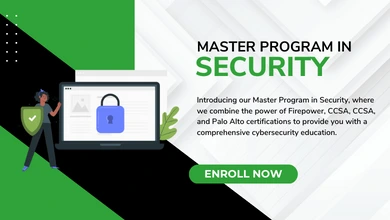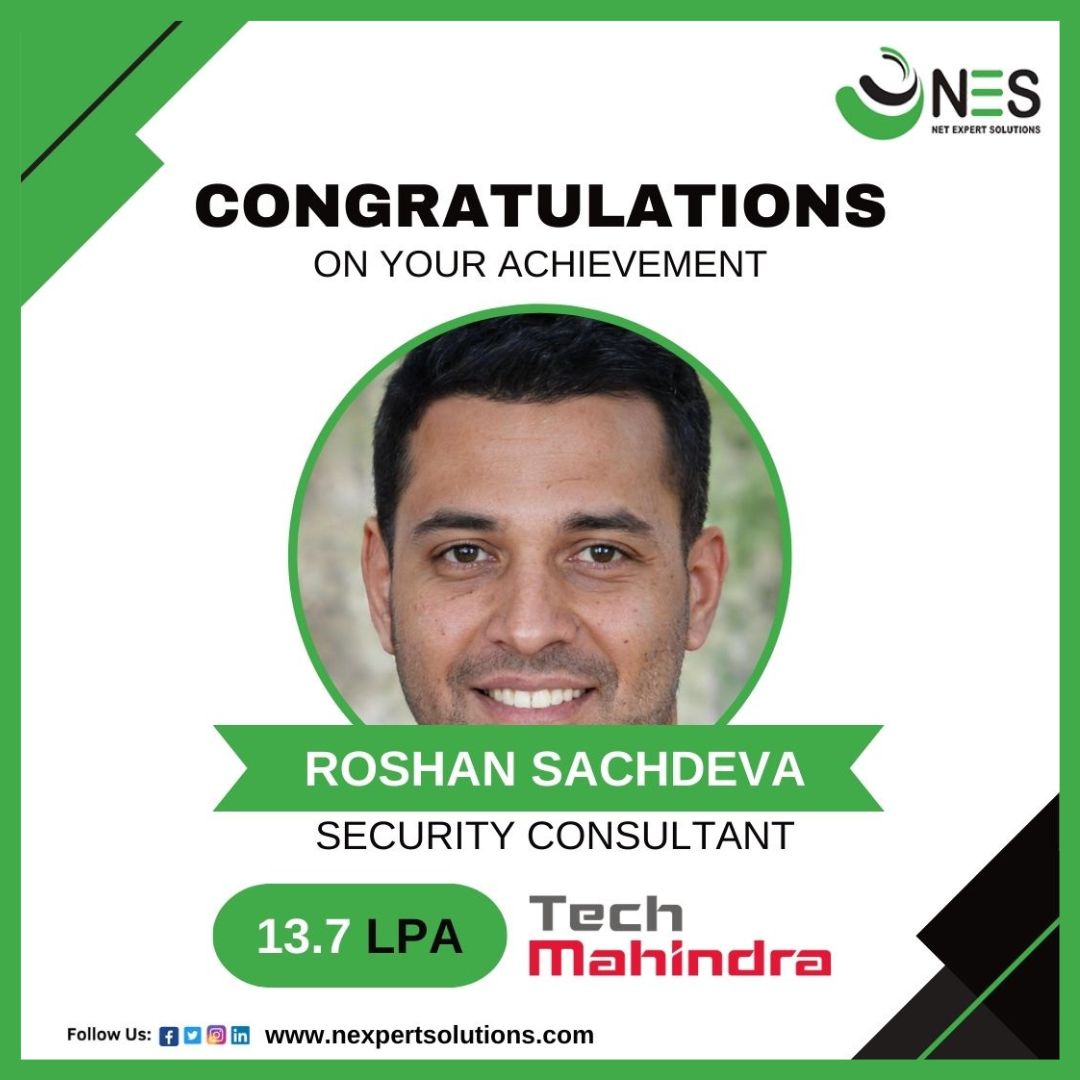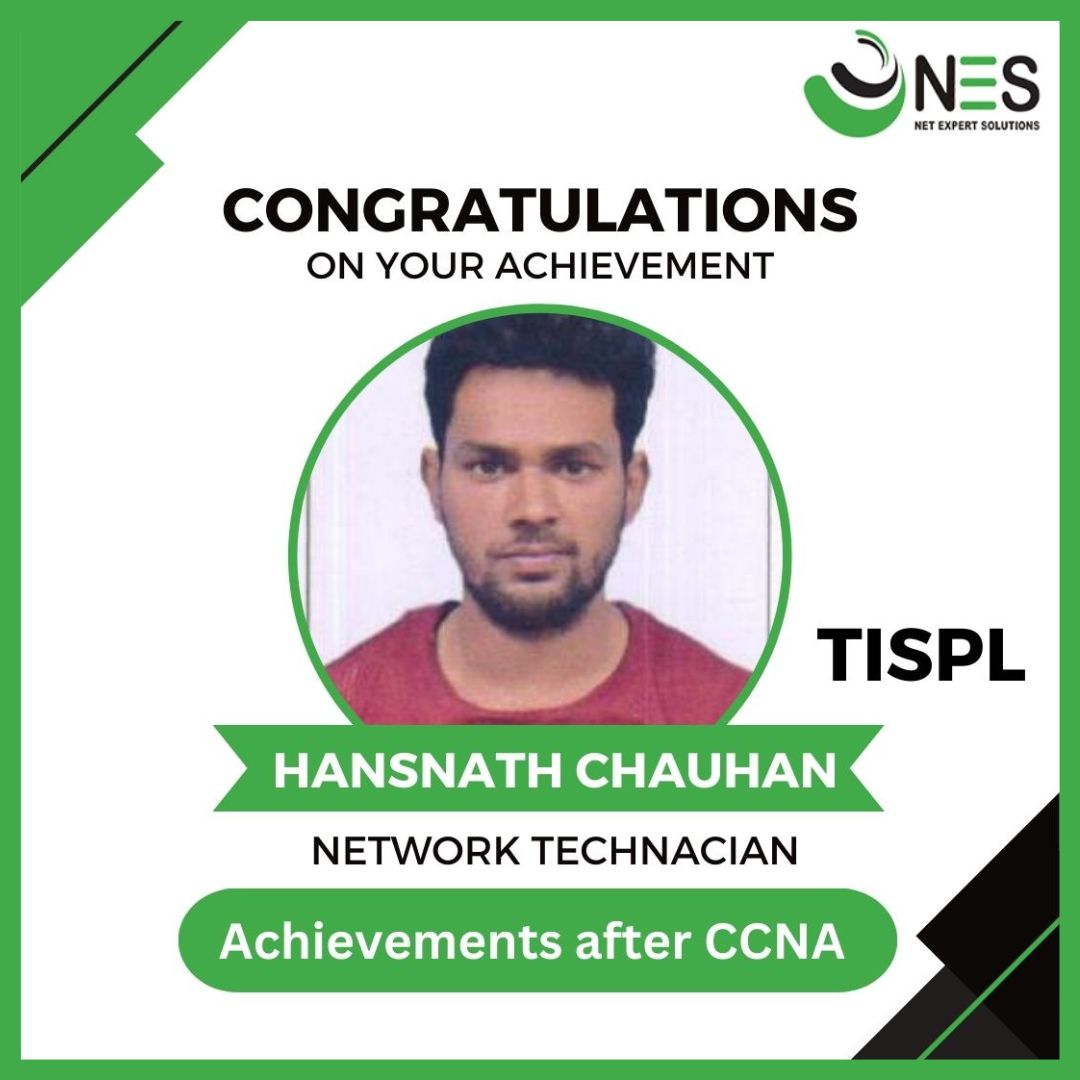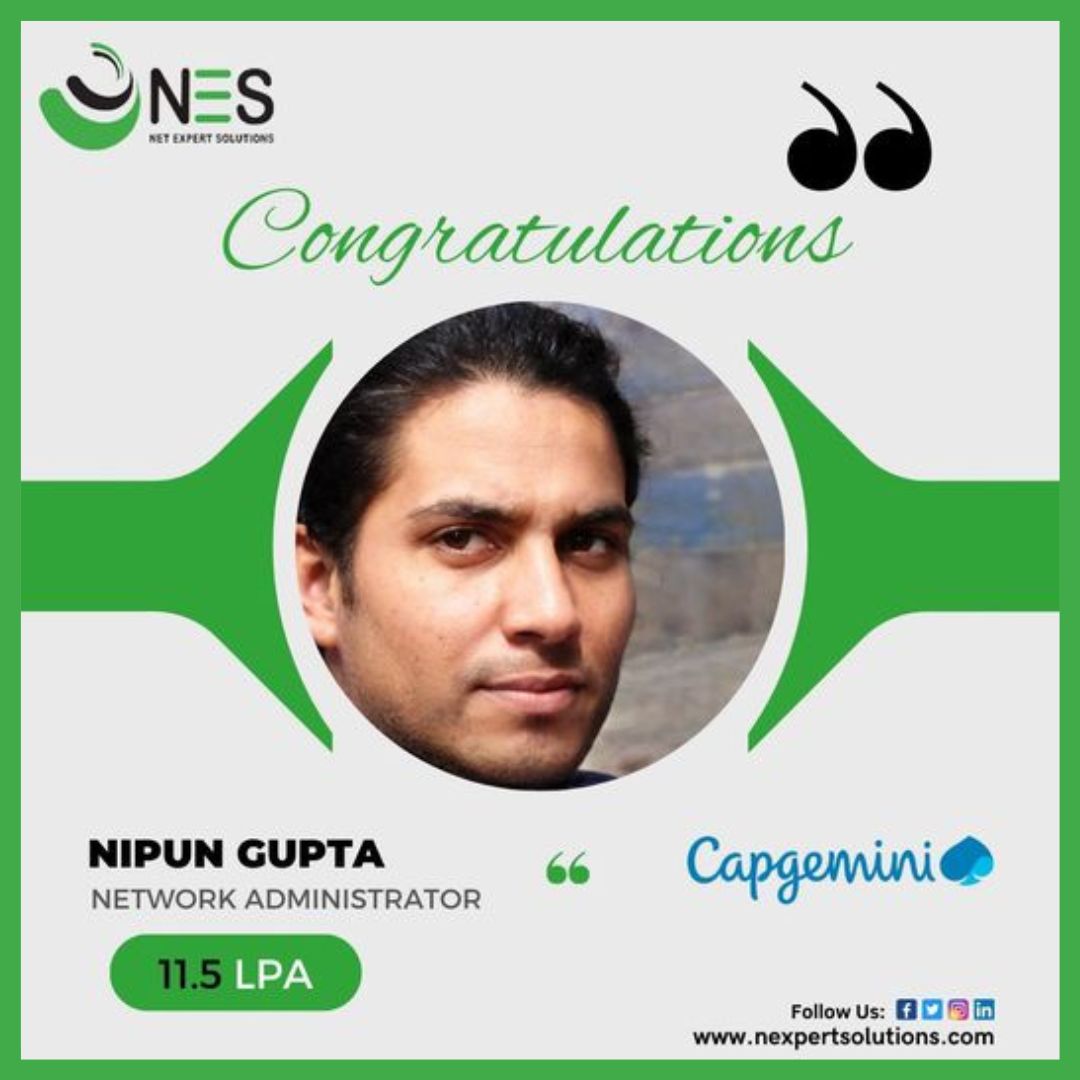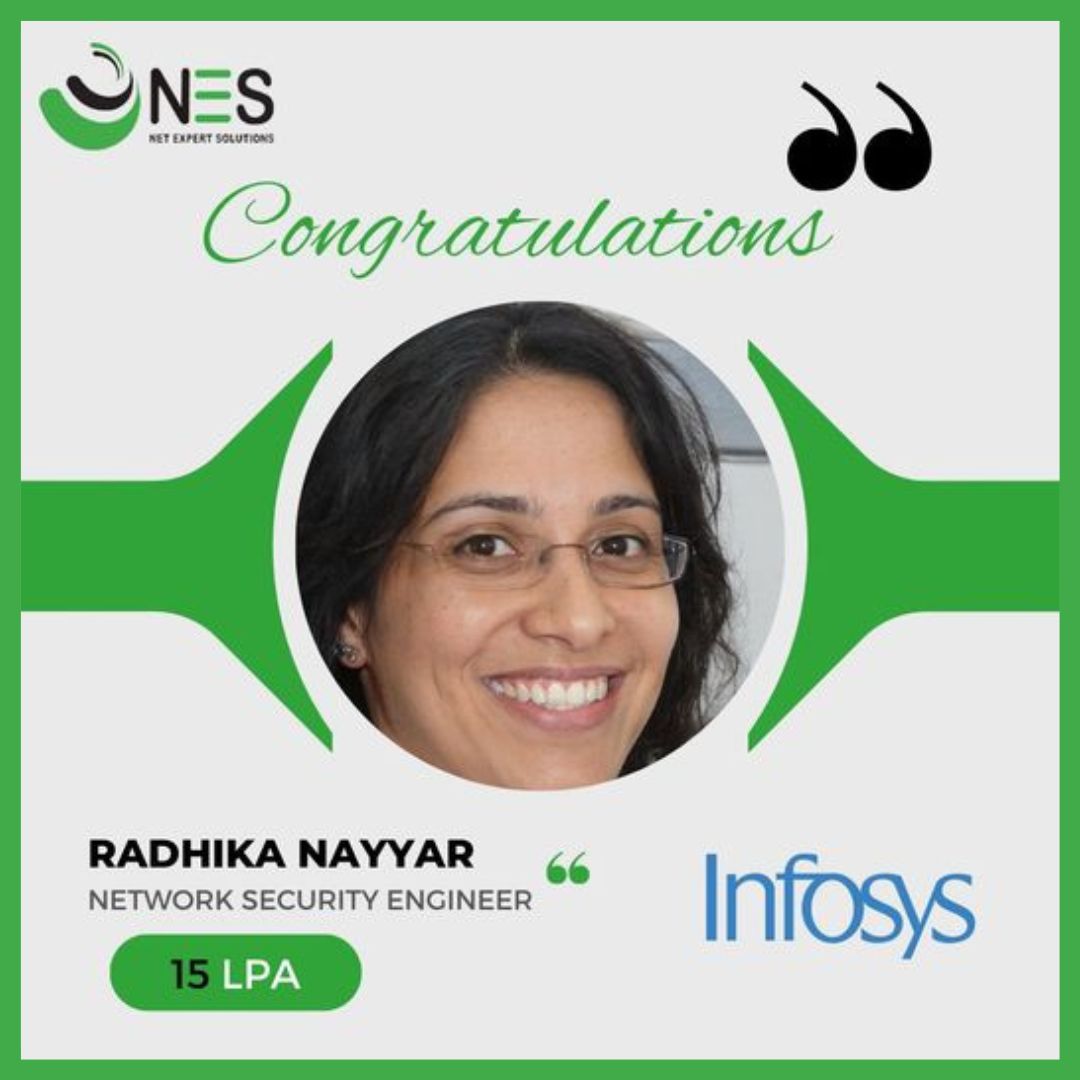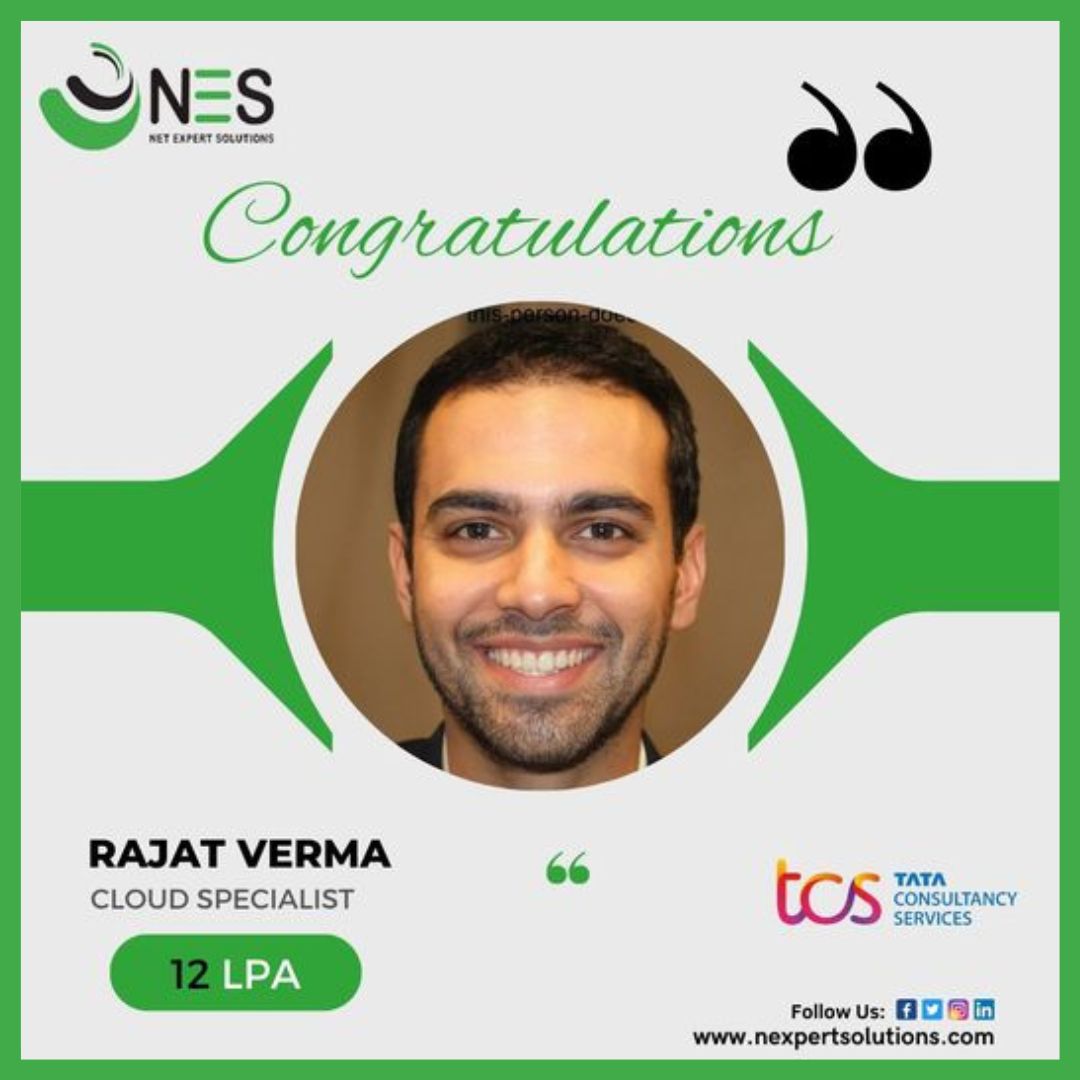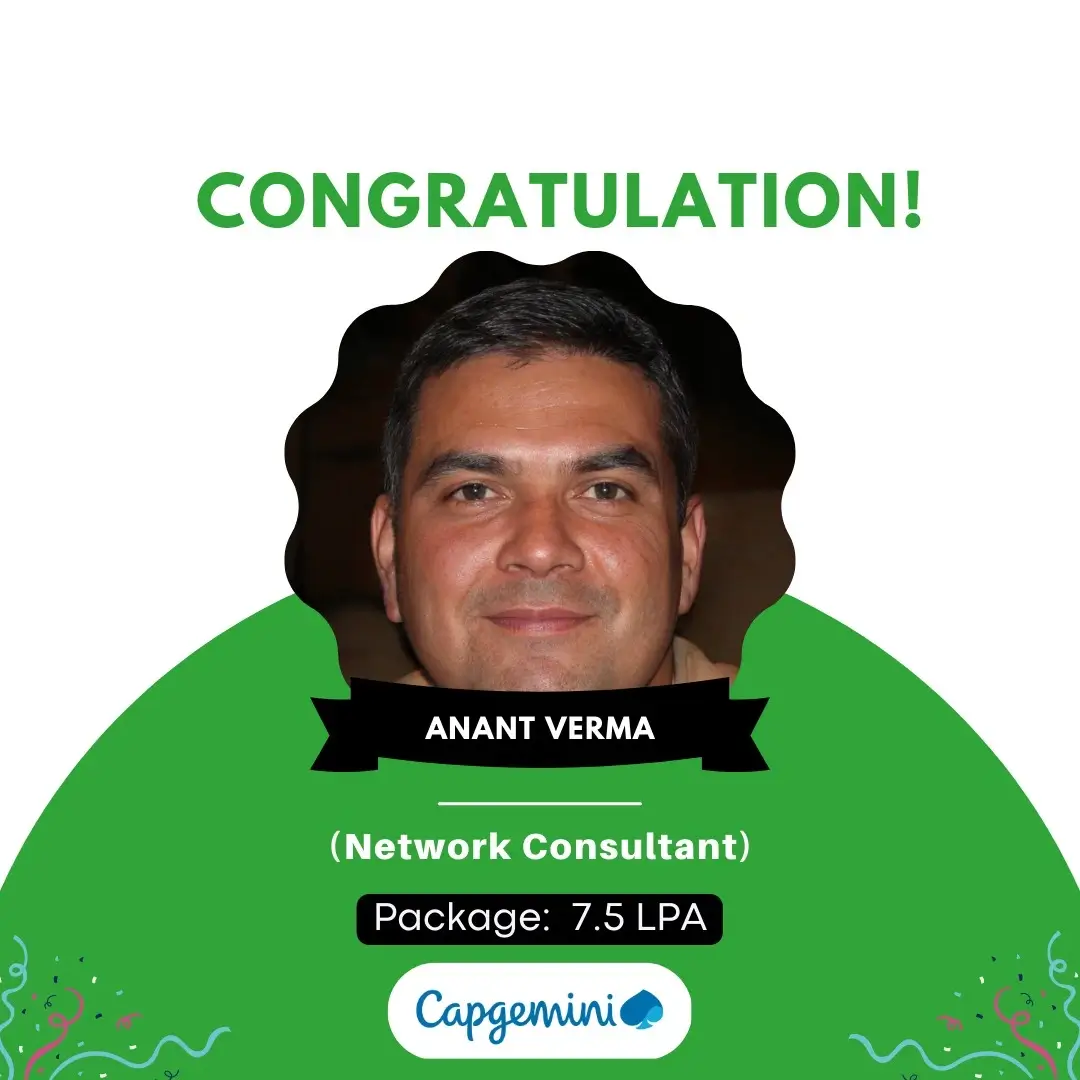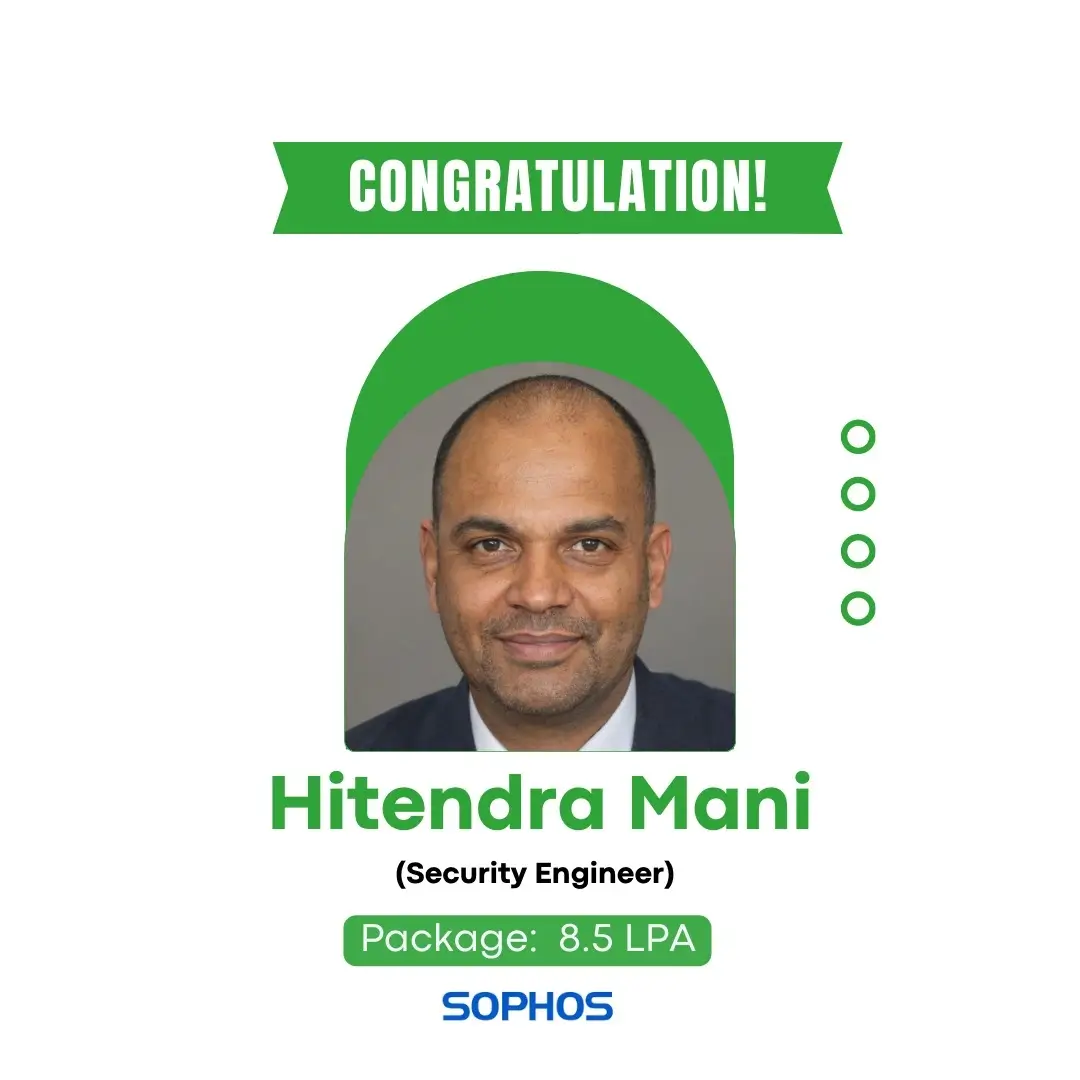CCNP Security Certification Training Course Online
- 40 Hours
- Online-Classroom
- 55596 Student Enrolled
Best CCNP Security Training & Certification Online
"Get Expert Guide For Your Better Career Guidance."
CCNP Security Online Certification Training Course
Cisco CCNP Security certification With No.1 Networking Institute CCNP Security is a professional-level certification offered by Cisco that validates the knowledge and skills required to secure Cisco networks. This certification is designed for network security professionals, network engineers, security analysts, and security consultants who are responsible for securing networks and network devices.
To earn CCNP Security certification , candidates must pass four exams that cover a broad range of security technologies and solutions, including network security, cloud security, VPN security, endpoint security, and content security. These exams are:
- Implementing and Operating Cisco Security Core Technologies (SCOR 350-701)
- Implementing and Configuring Cisco Identity Services Engine (SISE 300-710)
- Securing Networks with Cisco Firepower Next-Generation Firewall (SSNGFW 300-710)
- Implementing Secure Solutions with Virtual Private Networks (SVPN 300-730)
Download CCNP Security Content
The CCNP Security certification provides candidates with the knowledge and skills to design, deploy, and manage secure Cisco networks, and it demonstrates their expertise in the latest security technologies and solutions. It is a valuable credential for those seeking to advance their career in network security and is recognized globally as a mark of excellence in the field.
Benefits of CCNP Security certification include enhanced knowledge and skills in service provider network technologies, career advancement opportunities, professional credibility, networking opportunities, keeping up with the latest technology, and increased confidence.
At Net Expert Solutions, we offer CCNP Security training courses that provide comprehensive coverage of the exam topics and prepare candidates for success on the certification exams. Our courses are taught by experienced instructors who have extensive knowledge of the security technologies and solutions covered on the exams. We also offer flexible learning options, including self-paced online courses and instructor-led virtual or on-site training, to accommodate the busy schedules of working professionals.
In Networking Net Expert Solutions is considered as one of the best CCNP Security Training Institute not just based we Provide Training in Worldwide Like USA, London, Canada, Dubai, UAE are major countries we are the best in the whole World. NES also provide Networking Project based Networking Industrial Like Summer Trainings, Internship Trainings, Job Oriented Training Online Cover also. If you are looking for training on All New CCNP Security Certification, then Net Expert Solutions is your best choice only. NES always provides and believes to work in Placement/Job Assistance and JOB Guarantee
Services Provided By Nes During CCNP Security Certification Training
- Material: PPT’s I Recording Video’s I Workbook I Lab Access I Software as Required
- Support: 24/7 Lab & Management Support
- Webinar: Free Webinar’s With Industry Experts in New Technologies
- Placement: 100% Placement Guarantee/Assistance (Condition Applicable)
- NES Certificate: After Training & Feedback Process
- Vendor Exam: Help to Book the Vendor Exam
What You Learn During This CCNP Security Training Course
In 40 Hours CCNP Security, During your CCNP Security training , you'll learn how to deploy and manage Cisco networks. You'll also learn how to configure and optimize these networks for performance and efficiency. This comprehensive training will help you secure your business and seize opportunities in the competitive marketplace.
If you're looking for a CCNP Security training provider that can help you reach your career goals, look no further than Networking Net Expert Solutions. Not only is this organization considered one of the best in the world, but their training methods are second to none.
Whether you're based Online or one of the other major metropolitan areas NES offers training in, you'll be able to find the perfect program for your needs. Plus, their worldwide presence makes them a prime choice for anyone looking to further their career.
Pre-requisite Of CCNP Security Course
Before going for this training, you should understand Some Concept of Networking
Next Steps CCNP Security Certification & Training Course
Why Choose Nes I Services for CCNP Security Course
- In- Depth Technology Knowledge In Real World Network
- Career Guidance With 4xCCIE Instructor
- 100% Placement Record in MNC’s
- Materials: Recordings I PPT’s I Official Books I Class Notes
- Interview Preparation By 4xCCIE Trainer
- Vendors Certified & 8+ Years Experienced Trainers From Networking Industry
- 24×7 Training I Lab I Management Support
- Retake Training Option (On Demand)
- Life-Time Doubt Support With Same Technology
- Focus on Current & Emerging Technology
- Innovative Technology Method
- FREE Placement/ Consultancy
- Dedicated Lab For Individuals
- Technical Exam Support Till Exam Date
- Relevant Material For Exams
- 100% Success Rate for Exams
- 100% Success Guarantee in Technology & Exam Assistance
- Your Expertise Our Desire
Implementing and Operating Cisco Security Core Technologies v1.0 (350-701)
Exam Description:Implementing and Operating Cisco Security Core Technologies v1.0 (SCOR 350-701) is a 120-minute exam associated with the CCNP and CCIE Security Certifications. This exam tests a candidate's knowledge of implementing and operating core security technologies including network security, cloud security, content security, endpoint protection and detection, secure network access, visibility and enforcements. The course, Implementing and Operating Cisco Security Core Technologies, helps candidates to prepare for this exam.
- 1.1 Explain common threats against on-premises and cloud environments
- 1.2 Compare common security vulnerabilities such as software bugs, weak and/or hardcoded passwords, SQL injection, missing encryption, buffer overflow, path traversal, cross-site scripting/forgery
- 1.3 Describe functions of the cryptography components such as hashing, encryption, PKI, SSL, IPsec, NAT-T IPv4 for IPsec, pre-shared key and certificate based authorization
- 1.4 Compare site-to-site VPN and remote access VPN deployment types such as sVTI, IPsec, Cryptomap, DMVPN, FLEXVPN including high availability considerations, and AnyConnect
- 1.5 Describe security intelligence authoring, sharing, and consumption
- 1.6 Explain the role of the endpoint in protecting humans from phishing and social engineering attacks
- 1.7 Explain North Bound and South Bound APIs in the SDN architecture
- 1.8 Explain DNAC APIs for network provisioning, optimization, monitoring, and troubleshooting
- 1.9 Interpret basic Python scripts used to call Cisco Security appliances APIs
- 2.1 Compare network security solutions that provide intrusion prevention and firewall capabilities
- 2.2 Describe deployment models of network security solutions and architectures that provide intrusion prevention and firewall capabilities
- 2.3 Describe the components, capabilities, and benefits of NetFlow and Flexible NetFlow records
- 2.4 Configure and verify network infrastructure security methods (router, switch, wireless)
- 2.5 Implement segmentation, access control policies, AVC, URL filtering, and malware protection
- 2.6 Implement management options for network security solutions such as intrusion prevention and perimeter security (Single vs. multidevice manager, in-band vs. out-ofband, CDP, DNS, SCP, SFTP, and DHCP security and risks)
- 2.7 Configure AAA for device and network access (authentication and authorization, TACACS+, RADIUS and RADIUS flows, accounting, and dACL)
- 2.8 Configure secure network management of perimeter security and infrastructure devices (secure device management, SNMPv3, views, groups, users, authentication, and encryption, secure logging, and NTP with authentication)
- 2.9 Configure and verify site-to-site VPN and remote access VPN
- 3.1 Identify security solutions for cloud environments
- 3.2 Compare the customer vs. provider security responsibility for the different cloud service models
- 3.3 Describe the concept of DevSecOps (CI/CD pipeline, container orchestration, and security
- 3.4 Implement application and data security in cloud environments
- 3.5 Identify security capabilities, deployment models, and policy management to secure the cloud
- 3.6 Configure cloud logging and monitoring methodologies
- 3.7 Describe application and workload security concepts
- 4.1 Implement traffic redirection and capture methods
- 4.2 Describe web proxy identity and authentication including transparent user identification
- 4.3 Compare the components, capabilities, and benefits of local and cloud-based email and web solutions (ESA, CES, WSA)
- 4.4 Configure and verify web and email security deployment methods to protect onpremises and remote users (inbound and outbound controls and policy management)
- 4.5 Configure and verify email security features such as SPAM filtering, antimalware filtering, DLP, blacklisting, and email encryption
- 4.6 Configure and verify secure internet gateway and web security features such as blacklisting, URL filtering, malware scanning, URL categorization, web application filtering, and TLS decryption
- 4.7 Describe the components, capabilities, and benefits of Cisco Umbrella
- 4.8 Configure and verify web security controls on Cisco Umbrella (identities, URL content settings, destination lists, and reporting)
- 5.1 Compare Endpoint Protection Platforms (EPP) and Endpoint Detection & Response (EDR) solutions
- 5.2 Explain antimalware, retrospective security, Indication of Compromise (IOC), antivirus, dynamic file analysis, and endpoint-sourced telemetry
- 5.3 Configure and verify outbreak control and quarantines to limit infection
- 5.5 Describe the value of endpoint device management and asset inventory such as MDM
- 5.6 Describe the uses and importance of a multifactor authentication (MFA) strategy
- 5.7 Describe endpoint posture assessment solutions to ensure endpoint security
- 5.8 Explain the importance of an endpoint patching strategy
- 6.1 Describe identity management and secure network access concepts such as guest services, profiling, posture assessment and BYOD
- 6.2 Configure and verify network access device functionality such as 802.1X, MAB, WebAuth
- 6.3 Describe network access with CoA
- 6.4 Describe the benefits of device compliance and application control
- 6.5 Explain exfiltration techniques (DNS tunneling, HTTPS, email, FTP/SSH/SCP/SFTP, ICMP, Messenger, IRC, NTP)
- 6.6 Describe the benefits of network telemetry
- 6.7 Describe the components, capabilities, and benefits of these security products and solutions
FAQ
- CCNP Security certification is a professional certification program offered by Cisco Systems, a leading networking and telecommunications technology company. It is designed to validate the knowledge and skills of IT professionals who are responsible for securing Cisco networks.
- Yes, Cisco offers online exams for CCNP Security certification. Candidates can take the exams from the comfort of their own homes or offices, provided they have a reliable internet connection, a compatible computer, and a private, distraction-free environment.
- To earn CCNP Security certification, candidates must meet the following prerequisites:
1. Valid Cisco CCNA Security certification or any Cisco CCIE certification.
2. Knowledge and experience in networking fundamentals, including TCP/IP, routing, switching, and firewall technologies.
3. Understanding of VPN technologies, including IPsec, SSL VPN, and DMVPN.
4. Knowledge and experience in Cisco ASA firewalls, Cisco IOS firewalls, and Cisco Firepower Next-Generation Firewalls.
5. Experience with Cisco Identity Services Engine (ISE) and Cisco Stealthwatch for network security monitoring.
6. Familiarity with network security concepts, such as secure access control, network segmentation, and threat defense.
It is recommended that candidates have at least three to five years of experience in network security before attempting the CCNP Security certification exams. Additionally, candidates should be familiar with industry-standard security protocols and have experience in implementing security solutions in a real-world environment. Cisco provides study materials and training programs to help candidates prepare for the certification exams and gain the necessary knowledge and skills.
- To earn CCNP Security certification, you will need to pass the following exams:
1. Implementing and Operating Cisco Security Core Technologies (SCOR 350-701) - This exam tests your knowledge of implementing and operating core security technologies including network security, cloud security, content security, endpoint protection, secure network access, visibility, and enforcement. 2. Concentration Exam - You must also pass one concentration exam of your choice, based on your area of interest or specialization. The concentration exams available are:
• Securing Networks with Cisco Firepower Next-Generation Firewall (SNCF 300-710)
• Implementing and Configuring Cisco Identity Services Engine (SISE 300-715)
• Securing Email with Cisco Email Security Appliance (SESA 300-720)
• Securing the Web with Cisco Web Security Appliance (SWSA 300-725)
• Implementing Secure Solutions with Virtual Private Networks (SVPN 300-730)
• Implementing Automation for Cisco Security Solutions (SAUTO 300-735)
These exams are designed to test and validate your knowledge and skills in implementing, configuring, and troubleshooting Cisco security technologies and solutions. By passing these exams, you demonstrate your expertise in securing networks, devices, applications, and data using Cisco security technologies and solutions.
- The format of the CCNP Security certification exams is computer-based and consists of multiple-choice questions, drag-and-drop questions, simulation-based questions, and other types of interactive questions. The exams are typically administered at Pearson VUE testing centres, Net Expert Solutions is also a person VUE Authorised Center, and you can register and schedule your exam through the Pearson VUE website. On the day of the exam, you will be provided with an online tutorial that will help you understand the exam format and functionality, and you will have the opportunity to take a short break between exam sections. The total duration of the exam varies depending on the specific exam, but most exams are approximately 90 minutes to 120 minutes long. The passing score for each exam may also vary, but it is usually around 70-80%. Before taking the exam, it is recommended that you review the exam topics and prepare using resources such as Cisco's official study materials, practice tests, and other study aids to increase your chances of success.
- The CCNP Security certification exams cover a broad range of security-related topics, including:
1. Implementing and Operating Cisco Security Core Technologies (SCOR 350-701):
• Security concepts and threats
• Network security architecture and components
• Secure network infrastructure
• Secure endpoint and application protection
• Secure network access
• VPN and cryptography
• Secure cloud and virtualization
• Security automation and programmability
2. Concentration Exam:
The concentration exams cover specific security technologies and solutions, and the exam topics may vary depending on the exam you choose to take. Here are some examples of the exam topics for each concentration exam:
• Securing Networks with Cisco Firepower Next-Generation Firewall (SNCF 300-710)
o NGFW concepts and components
o NGFW policies and configurations
o NGFW management and troubleshooting
o Integration with other security solutions
• Implementing and Configuring Cisco Identity Services Engine (SISE 300-715)
o ISE architecture and components
o ISE policy enforcement and authentication
o ISE endpoint compliance and posture
o BYOD and guest access
o Integration with other security solutions
• Securing Email with Cisco Email Security Appliance (SESA 300-720)
o Email security concepts and components
o ESA policies and configurations
o ESA message filters and content analysis
o ESA management and troubleshooting
o Integration with other security solutions
• Securing the Web with Cisco Web Security Appliance (SWSA 300-725)
o Web security concepts and components
o WSA policies and configurations
o WSA URL filtering and reputation
o WSA management and troubleshooting
o Integration with other security solutions
• Implementing Secure Solutions with Virtual Private Networks (SVPN 300-730)
o VPN concepts and components
o VPN policies and configurations
o VPN technologies and protocols
o VPN high availability and troubleshooting
o Integration with other security solutions
• Implementing Automation for Cisco Security Solutions (SAUTO 300-735)
o Network programmability concepts and APIs
o DevOps and automation tools
o Secure automation workflows and scripting
o Integration with other security solutions
These are just a few examples of the topics covered in the CCNP Security certification exams. It's important to review the exam topics and prepare thoroughly to ensure that you have a comprehensive understanding of the material.
- The amount of time it takes to prepare for the CCNP Security certification exams can vary depending on your level of experience, knowledge, and familiarity with the exam topics. Generally speaking, it may take several months of dedicated study and preparation to be fully ready for the exams.
Some factors that can influence the time it takes to prepare include:
1. Prior experience and knowledge: If you have already worked with Cisco security technologies and solutions, you may need less time to prepare for the exams. On the other hand, if you are new to the field, you may need to spend more time studying and practicing.
2. Study materials and resources: Using high-quality study materials such as Cisco's official study guides, practice exams, and other study aids can help you prepare more efficiently and effectively.
3. Study schedule: Creating a study schedule and sticking to it can help you stay on track and make steady progress toward your goal.
4. Exam readiness: Taking practice exams and reviewing your performance can help you gauge your exam readiness and identify areas where you need to focus your study efforts.
Overall, it's important to allow yourself enough time to thoroughly review and practice the exam topics. Don't rush the process, and be prepared to invest the necessary time and effort to achieve your certification goals.
- There are a variety of resources available to help you prepare for the CCNP Security certification exams. Some of the most commonly used resources include:
1. Cisco's official study materials: Cisco provides official study guides, practice exams, and other study aids that cover the exam topics in detail. These materials are often considered the most reliable and comprehensive resources for exam preparation.
2. Online courses and training programs: Many online training providers offer CCNP Security courses and training programs that can help you learn the material and prepare for the exams. These programs may include video lectures, interactive exercises, and other study aids.
3. Community forums and study groups: Joining online forums or study groups can provide you with a community of like-minded individuals who are also preparing for the exams. You can share study tips, ask questions, and get feedback from others.
4. Practice exams: Taking practice exams can help you familiarize yourself with the exam format and identify areas where you need to focus your study efforts. Cisco provides official practice exams, and there are also many third-party practice exams available online.
5. Hands-on experience: Hands-on experience working with Cisco security technologies and solutions can help you develop a deeper understanding of the material and prepare you for real-world scenarios that you may encounter on the job.
6. Cisco Learning Network: The Cisco Learning Network is a valuable resource that provides access to study materials, practice exams, and other resources to help you prepare for Cisco certifications, including CCNP Security.
Overall, it's important to use a variety of resources to prepare for the exams and tailor your study approach to your individual learning style and needs.
- The cost of earning CCNP Security certification can vary depending on a few factors, such as the location where you take the exams, whether you need to retake any exams, and the cost of study materials. Here is a breakdown of the typical costs associated with earning CCNP Security certification:
1. Exam fees: As of 2023, the cost for each CCNP Security exam is $350 USD. To earn CCNP Security certification, you must pass four exams, so the total cost for exam fees alone would be $1,400 USD.
2. Study materials: The cost of study materials can vary widely depending on the provider and the materials you choose to use. Cisco's official study guides for each exam typically cost around $60 to $80 USD each.
3. Training courses: If you choose to take training courses or workshops to prepare for the exams, the cost can range from a few hundred to several thousand dollars depending on the provider and the format of the training.
4. Retake fees: If you need to retake any exams, you will need to pay the exam fee again for each retake attempt.
It's worth noting that some employers may offer reimbursement for exam fees or training costs as part of their employee development programs, so it's worth checking with your employer to see if this is an option.
Overall, the cost of earning CCNP Security certification can add up quickly, but it's important to view it as an investment in your career development and earning potential.
- The time it takes to complete CCNP Security certification can vary depending on a few factors, such as your level of experience and the amount of time you can dedicate to studying and preparing for the exams. Here are some general guidelines for how long it may take to complete CCNP Security certification:
1. Exam scheduling: You may need to schedule each exam at least a few weeks in advance, depending on availability and location. It's a good idea to factor in some extra time for scheduling each exam.
2. Preparation time: The amount of time you need to prepare for each exam will depend on your level of experience and knowledge of the exam topics. It's recommended to allow at least 2-3 months of study time for each exam.
3. Number of exams: To earn CCNP Security certification, you need to pass four exams in total. Assuming you can pass each exam on the first attempt and don't need to retake any exams, it may take at least 8-12 months to complete all four exams.
4. Hands-on experience: In addition to studying for the exams, it's recommended to gain hands-on experience working with Cisco security technologies and solutions. This can help deepen your understanding of the material and prepare you for real-world scenarios that you may encounter on the job.
Overall, it's important to allow yourself enough time to study and prepare for each exam thoroughly. Rushing through the material or trying to cram for the exams is not recommended, as this may result in lower exam scores or the need to retake exams. Instead, take the time to study at a comfortable pace and focus on developing a solid understanding of the exam topics.
- Earning CCNP Security certification can open up a range of career opportunities in the field of network security. Here are some examples of roles and career paths that may be available to CCNP Security certified professionals:
1. Network Security Engineer: A network security engineer is responsible for designing, implementing, and maintaining security measures for computer networks. CCNP Security certification can be an asset in this role, as it demonstrates knowledge and expertise in Cisco security technologies.
2. Security Analyst: A security analyst helps to identify and respond to security threats and vulnerabilities in computer systems and networks. CCNP Security certification can be beneficial for this role, as it provides knowledge and understanding of security concepts and technologies.
3. Security Consultant: A security consultant provides guidance and advice to organizations on how to improve their security posture. CCNP Security certification can be valuable in this role, as it demonstrates expertise in Cisco security technologies and solutions.
4. Security Manager: A security manager is responsible for overseeing and managing an organization's overall security program. CCNP Security certification can be helpful in this role, as it provides a solid understanding of security technologies and best practices.
Overall, CCNP Security certification can be an asset for professionals seeking to advance their careers in network security. It demonstrates a commitment to learning and expertise in Cisco security technologies, which can be valuable to employers seeking skilled and knowledgeable security professionals.
- CCNP Security certification differs from other Cisco certifications in a few keyways:
1. Focus on Security: CCNP Security certification focuses specifically on network security technologies and solutions, while other Cisco certifications cover a broader range of topics such as routing and switching, wireless networking, and collaboration.
2. Professional-level: CCNP Security certification is a professional-level certification, which means it is designed for experienced network professionals who have already earned a lower-level certification such as CCNA Security or CCNA Routing and Switching. Other Cisco certifications are available at different levels, from entry-level to expert-level.
3. Multiple Exams: To earn CCNP Security certification, you must pass four exams, each of which covers a different aspect of network security. Other Cisco certifications may require a different number of exams or have different exam requirements.
4. Technology-specific: CCNP Security certification is focused specifically on Cisco security technologies and solutions, while other Cisco certifications may cover a broader range of vendor-neutral or multi-vendor technologies.
Overall, CCNP Security certification is a specialized certification that is designed for experienced network professionals who are seeking to deepen their knowledge and expertise in network security. It differs from other Cisco certifications in its focus, level, exam requirements, and technology-specific nature.
- As of my knowledge cutoff in 2021, the validity period of CCNP Security certification is three years. After this period, individuals holding this certification are required to recertify to maintain their active status. Recertification can be achieved by passing any current CCIE written or lab exam, passing a current CCNP exam, or passing a current CCNA Concentration exam. Additionally, passing a current Cisco Specialist exam can also recertify CCNP Security certification. It is important to note that Cisco may update their recertification requirements and policies, so it is recommended to check their official website for the most up-to-date information.
- Yes, you can take the CCNP Security exams online through the Cisco Online Testing platform. The platform allows you to take the exam remotely from your own computer, provided you meet the technical requirements and have a stable internet connection. To take the CCNP Security exams online, you will need to create an account on the Cisco Online Testing platform, schedule your exam, and pay the exam fee. You will also need to have a webcam and microphone on your computer, as well as a private and quiet room to take the exam. Before scheduling your exam, be sure to review the technical requirements and the exam policies on the Cisco website to ensure that you are fully prepared for the online exam experience. Additionally, note that some exams may require you to take them in-person at a testing center due to specific equipment or software requirements.
- The passing score for CCNP Security exams varies depending on the specific exam you are taking. Cisco does not publicly disclose the exact passing score for each exam, as the score is based on a complex statistical analysis of the questions and is subject to change. However, Cisco provides a score report at the end of each exam that indicates whether you passed or failed, as well as your overall score on the exam. In general, you can expect to need a score of at least 70% to pass a CCNP Security exam. It's important to note that passing the exam is only one step in earning your CCNP Security certification. You will also need to meet other requirements, such as completing prerequisite exams and/or training courses, in order to earn the certification. Be sure to review the certification requirements on the Cisco website for full details.
- If you fail a CCNP Security exam, you can retake the exam after a waiting period of five calendar days. However, you will need to pay the exam fee again for each attempt. You can take the exam up to three times in a 12-month period, after which you must wait for 12 months before attempting the exam again. If you fail the same exam three times within a 12-month period, you will need to wait for 12 months from the date of your last attempt before you can retake the exam. Additionally, if you fail an exam, Cisco provides a score report that identifies your strengths and weaknesses in the exam content. Use this feedback to identify areas where you need to improve before retaking the exam. It's important to note that earning a CCNP Security certification requires passing multiple exams, so if you fail one exam, it may delay your progress towards earning the certification. Be sure to take advantage of the resources available to help you prepare for the exam, such as study materials and training courses, to increase your chances of passing on your next attempt.
- To recertify for CCNP Security certification, you must pass any 300-level Cisco professional-level or Cisco specialist exam (excluding Sales Specialist exams), or pass a current CCIE written exam. Additionally, you can also recertify by passing any Cisco professional-level concentration exam or passing the Cisco Certified Architect (CCAr) interview and board review. You can also recertify your CCNP Security certification by earning a higher-level certification, such as the Cisco Certified Internetwork Expert (CCIE) Security certification. If you earn a higher-level certification, it automatically recertifies all lower-level certifications, including CCNP Security. Another option for recertification is to complete the Cisco Continuing Education Program, which allows you to earn Continuing Education Credits (CECs) through activities such as attending Cisco Live events, completing online training courses, or participating in Cisco Learning Network study groups. You can earn enough CECs to recertify your CCNP Security certification for an additional three years. It's important to note that CCNP Security certification is valid for three years, after which you must recertify to maintain your certification status. Be sure to review the recertification options and requirements on the Cisco website to ensure that you stay up to date with the latest recertification requirements.
- The CCNP Security recertification policy requires that you recertify your certification every three years to maintain your certification status. Failure to recertify will result in the expiration of your certification and the loss of any associated benefits. To recertify your CCNP Security certification, you must pass any 300-level Cisco professional-level or Cisco specialist exam (excluding Sales Specialist exams), or pass a current CCIE written exam. You can also recertify by passing any Cisco professional-level concentration exam or passing the Cisco Certified Architect (CCAr) interview and board review. In addition to exam-based recertification, you can also recertify through the Cisco Continuing Education Program. This program allows you to earn Continuing Education Credits (CECs) through a variety of activities, such as attending Cisco Live events, completing online training courses, or participating in Cisco Learning Network study groups. You can earn enough CECs to recertify your CCNP Security certification for an additional three years. It's important to note that you must recertify before your certification expires to avoid a gap in your certification status. If your certification expires, you will need to start the certification process from the beginning and meet all current certification requirements. Be sure to review the recertification options and requirements on the Cisco website to ensure that you stay up to date with the latest recertification policy.
-
• To maintain your CCNP Security certification, you must recertify every three years. There are several ways to recertify your certification, including passing any 300-level Cisco professional-level or Cisco specialist exam (excluding Sales Specialist exams), or passing a current CCIE written exam. You can also recertify by passing any Cisco professional-level concentration exam or passing the Cisco Certified Architect (CCAr) interview and board review.
• In addition to exam-based recertification, you can also recertify through the Cisco Continuing Education Program. This program allows you to earn Continuing Education Credits (CECs) through a variety of activities, such as attending Cisco Live events, completing online training courses, or participating in Cisco Learning Network study groups. You can earn enough CECs to recertify your CCNP Security certification for an additional three years.
• It's important to note that you must recertify before your certification expires to maintain your certification status. Failure to recertify will result in the expiration of your certification and the loss of any associated benefits.
• To ensure that you stay up to date with the latest certification requirements and recertification options, be sure to regularly review the CCNP Security certification page on the Cisco website. Additionally, consider joining the Cisco Learning Network community to connect with other professionals and access study materials and resources to help you maintain and advance your skills.
-
• CCNP Security certification is highly valued in the job market, particularly in roles that involve designing, implementing, and maintaining network security solutions. This certification is designed for experienced network security professionals who have a deep understanding of security technologies and principles.
• Employers often look for CCNP Security certified professionals when hiring for network security positions, as it demonstrates that the individual has the skills and knowledge necessary to manage and secure complex network environments. Holding this certification can also help professionals stand out from their peers and increase their earning potential.
• In addition to the technical skills and knowledge gained through the certification process, CCNP Security certified professionals are also equipped with problem-solving and critical thinking skills that are highly valued in the job market. These skills enable individuals to analyse complex security threats and develop effective solutions to mitigate them.
• Overall, CCNP Security certification is an excellent way for network security professionals to validate their expertise and increase their marketability in a highly competitive job market. It can open up new opportunities for career growth and advancement, as well as increase earning potential.
| Training Duration | 40 Hours |
|---|---|
| Module | SCOR + 1 Concentration |
| Language | English | Hindi |
| Training Cost | |
| Certification Cost | SCOR Exam USD $400 Concentration USD $300 |
| Tuesday-Friday | 1.5 Hours/Day |
| Saturday-Sunday | 2 Hours/Day |
| Training Mode | Online/Classroom |

